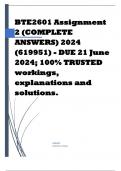BTE2601 Assignment
2 (COMPLETE
ANSWERS) 2024
(619951) - DUE 21 June
2024; 100% TRUSTED
workings,
explanations and
solutions.
ADMIN
[COMPANY NAME]
,QUESTION 1 1.1. Define the following terms: 1.1.1. Pedagogy
(2) 1.1.2. Pedagogical Content Knowledge (2) 1.1.3.
Epistemologies (2) 1.1.4. Rote learning (2) 1.1.5. Indigenous
Knowledge Systems (2) (10)
Certainly! Let's define and explain each of these terms in detail:
1.1.1. Pedagogy
Definition: Pedagogy refers to the method and practice of
teaching, especially as an academic subject or theoretical
concept.
Explanation: Pedagogy encompasses the various approaches,
techniques, and strategies that educators use to facilitate
learning. It involves understanding how students learn and the
best ways to teach them, considering factors such as
developmental stages, learning styles, and educational theories.
Effective pedagogy is responsive to the needs of students and
can vary significantly depending on the context, subject matter,
and goals of instruction. It is not only about the transmission of
knowledge but also about fostering critical thinking, problem-
solving, and lifelong learning skills.
1.1.2. Pedagogical Content Knowledge
, Definition: Pedagogical Content Knowledge (PCK) is the
integration of subject expertise and teaching knowledge,
enabling educators to effectively teach specific content.
Explanation: PCK is a concept introduced by Lee Shulman that
emphasizes the importance of teachers not only understanding
the subject matter but also knowing how to teach it in a way that
makes it comprehensible to students. This includes knowing
what makes certain topics easy or difficult for students, what
preconceptions they might bring to the learning process, and the
most effective ways to address these issues. PCK involves
blending content knowledge with pedagogical strategies to
enhance student understanding and engagement.
1.1.3. Epistemologies
Definition: Epistemologies refer to the study of knowledge, its
nature, origin, and limits.
Explanation: Epistemology is a branch of philosophy
concerned with the theory of knowledge. It explores questions
such as: What is knowledge? How is knowledge acquired? What
do people know? How do we know what we know?
Epistemologies influence educational practices by shaping how
educators and learners perceive knowledge and learning
processes. Different epistemological perspectives, such as
constructivism or empiricism, can lead to different approaches
to teaching and learning.
1.1.4. Rote Learning




